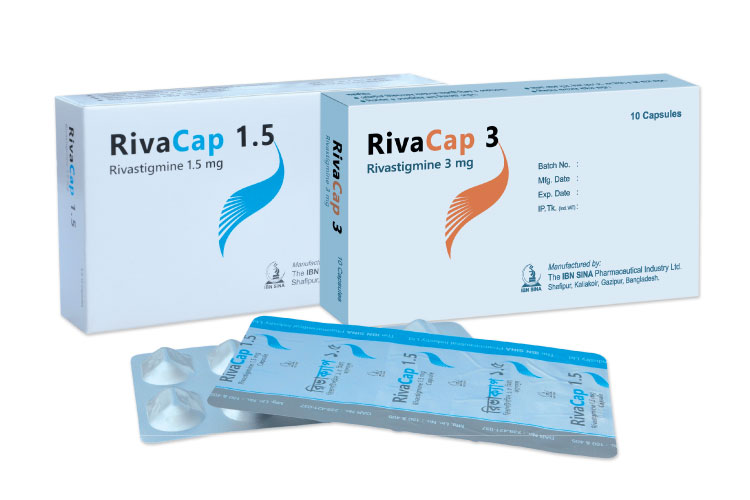
RIVACAP
RIVASTIGMINE TARTRATE USP
| NAME | STRENGTH | PACK SIZE | DOSAGE FORM |
|---|---|---|---|
| RIVACAPÂ 1.5Â CAPSULE | 1.5 MG | 30 S | CAPSULE |
| RIVACAPÂ 3Â CAPSULE | 3 MG | 10 S | CAPSULE |
RivaCap 1.5 Capsule: Each capsule contains Rivastigmine Tartrate USP equivalent to Rivastigmine 1.5 mg.
RivaCap 3 Capsule: Each capsule contains Rivastigmine Tartrate USP equivalent to Rivastigmine 3 mg.
Rivastigmine is a carbamate derivative that is structurally related to physostigmine, but not to donepezil and tacrine. Rivastigmine binds reversibly with and inactivates chlolinesterase (eg. acetylcholinesterase, butyrylcholinesterase), preventing the hydrolysis of acetycholine, and thus leading to an increased concentration of acetylcholine at cholinergic synapses. The anticholinesterase activity of Rivastigmine is relatively specific for brain acetylcholinesterase and butyrylcholinesterase compared with those in peripheral tissues.
Alzheimer’s Disease
Rivastigmine is indicated for the treatment of mild-to-moderate dementia of the Alzheimer's type (AD). Parkinson’s Disease Dementia
Rivastigmine is indicated for the treatment of mild-to-moderate dementia associated with Parkinson’s disease (PD).
Rivastigmine should be taken with meals in divided doses in the morning and evening.
Initial Dose: Initiate treatment with the 1.5 mg twice a day with Rivastigmine.
Dose Titration: After a minimum of 2 weeks and if well tolerated, increase the dose to 3 mg twice a day. Subsequent increases to 4.5 mg twice a day and 6 mg twice a day should be attempted after a minimum of 2 weeks at the previous dose and if well tolerated. The maximum dose is 6 mg twice a day (12 mg per day).
Dosing in specific populations
Renal Impairment
Patients with moderate and severe renal impairment may be able to only tolerate lower doses.
Hepatic Impairment
Patients with mild and moderate hepatic impairment may be able to only tolerate lower doses. No data are available on the use of Rivastigmine in patients with severe hepatic impairment.
Low Body Weight
Carefully titrate and monitor patients with low body weight (less than 50 kg) for toxicities (e.g., excessive nausea, vomiting), and consider reducing the dose if such toxicities develop.
Rivastigmine is contraindicated in patients with: known hypersensitivity to Rivastigmine, other carbamate derivatives or other components of the formulation.
Patients with sick sinus syndrome or conduction defects, resp diseases. Cholinergic stimulation may increase gastric acid secretion. May exacerbate urinary obstruction and seizures. Pregnancy. Renal impairment, mild to moderate hepatic impairment. Monitor body wt. Asthma or obstructive pulmonary disease. May worsen extrapyramidal symptoms. Lactation.
The most commonly reported adverse reactions are gastrointestinal, including nausea (38%) and vomiting (23%), especially during titration. Female patients in clinical studies were found to be more susceptible than male patients to gastrointestinal adverse reactions and weight loss.
Rivastigmine is classified as pregnancy category B, with insufficient data on risks associated with breastfeeding. Rivastigmine should be used during pregnancy or lactation only if the potential benefit justifies the potential risk to the fetus.
Rivastigmine is contraindicated in patients with: known hypersensitivity to Rivastigmine, other carbamate derivatives or other components of the formulation.
Most cases of accidental overdose have not been associated with any clinical signs or symptoms and almost all of the patients concerned continued Rivastigmine treatment. Where symptoms have occurred, they have included nausea, vomiting and diarrhoea, hypertension or hallucinations. Due to the known vagotonic effect of cholinesterase inhibitors on heart rate, bradycardia and/or syncope may also occur. Ingestion of 46 mg occurred in one case; following conservative management the patient fully recovered within 24 hours. As Rivastigmine has a plasma half-life of about 1 hour and a duration of acetylcholinesterase inhibition of about 9 hours, it is recommended that in cases of asymptomatic overdose no further dose of Rivastigmine should be administered for the next 24 hours. In overdose accompanied by severe nausea and vomiting, the use of antiemetic’s should be considered. Symptomatic treatment for other adverse reactions should be given as necessary. In massive overdose, Atropine can be used. An initial dose of 0.03 mg/kg intravenous Atropine Sulphate is recommended, with subsequent doses based on clinical response. Use of Scopolamine as an antidote is not recommended.
Store at below 25°C in a dry place protected from light. Keep out of reach of Children.
Rivacap 1.5 Capsule: Each box contains 3 x 10 capsules in Alu-Alu blister pack.
Rivacap 3 Capsule: Each box contains 1 x 10 capsules in Alu-Alu blister pack.
